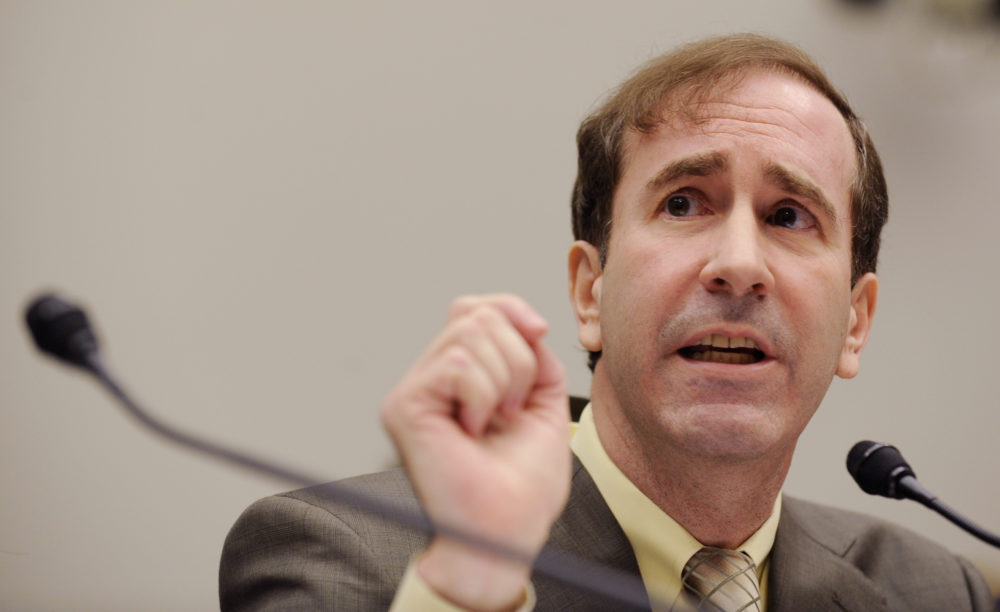Advertisement
Madoff Whistleblower Claims GE Misrepresents Its Finances
Resume
Harry Markopolos, the whistleblower in the Bernard Madoff fraud, is taking aim at a new target: General Electric.
In a 175-page report obtained by WBUR Thursday morning, Markopolos and a group of forensic accountants alleged that the Boston-based company is hiding financial trouble at its long-term care insurance operation and in its stake in Baker Hughes, an oil and gas business.
GE needs $18.5 billion more in reserves for its insurance group, the report alleged, and it is underreporting losses on its Baker Hughes investment.
"This is a company in dire financial straits," said Markopolos in a WBUR interview. "It's cash flow negative. It's upside down.”
GE, in a statement, called the report “meritless” and based on “unsubstantiated claims.” The company said it stands by its reserve levels for its GE insurance unit, as well as the way it’s handling accounting for the oil and gas business. The company also said it has plenty of cash, refuting Markopolos’ allegations that cash flow will be drying up in the coming years.
The Wall Street Journal first reported on the GE report Thursday morning. Shares of GE fell more than 12% in morning trading, in reaction to the news.
Markopolos disclosed he was working with an unnamed hedge fund that stood to gain from a decline in GE shares. He could personally reap profits from that hedge fund as well. Markopolos also stands to make money if regulators find wrongdoing at GE; he submitted his report to federal regulators at the Securities and Exchange Commission and the U.S. Department of Justice, according to a disclosure on his website.
Markopolos said he had decided to give the hedge fund a first look at his report, in return for compensation, in order to pay himself and his team for their work.
“The SEC whistleblower program is taking decades to pay," he said. "They have a decades-long backlog to pay whistleblowers. The program is too overly bureaucratic, and they owe my team a lot of money. And we have to support our families.”
GE, which nominally moved its headquarters to Boston in 2016, has dramatically scaled back its presence amid its own forecast of lower profit targets and weak cash flow. The company in February abandoned plans to build new offices in the Fort Point Channel neighborhood, in the Seaport District, and said it would reimburse the state $87 million in incentives paid to lure the company here and move hundreds of top employees to Boston.
"Instead of putting in the amount of employees they promised the state, they're putting in only a percentage of those employees," Markopolos said.
Peter Cohan, a lecturer at Babson College in Wellesley and a GE shareholder, said he was skeptical about the report, but also worried. He is calling for GE to have an independent investigation of its accounting practices.
Cohan said, if “all the numbers are overstated and the whole thing is fraud then I think investors are going to lose confidence, and lenders are going to lose confidence, and the company could be in some serious trouble."
Markopolos in his GE report said he and his team have spent seven months analyzing GE’s financials. GE first came on his radar in the late 1990s, when he began talking to investment managers and analysts in Boston, who, he said, questioned how the company’s numbers “met or beat consensus earnings estimates every quarter, year after year, no matter what the economy was doing.”
Markopolos became famous for trying, unsuccessfully, to alert the SEC to the multi-billion-dollar Madoff fraud, which burst into the public eye in 2008.
He has taken on other large targets in recent years, including Boston financial giant State Street Corporation and the MBTA pension fund. At State Street, he found widespread evidence of overcharging clients for foreign-currency trading, leading to hundreds of millions of dollars of regulatory settlements in that industry.
At the transit authority pension fund, he and a team alleged large overstatements in investment returns and retirement assets. It has denied the allegations, but is under political pressure to move some of its assets to the oversight of the larger state pension fund.
This article was originally published on August 15, 2019.
This segment aired on August 15, 2019.
